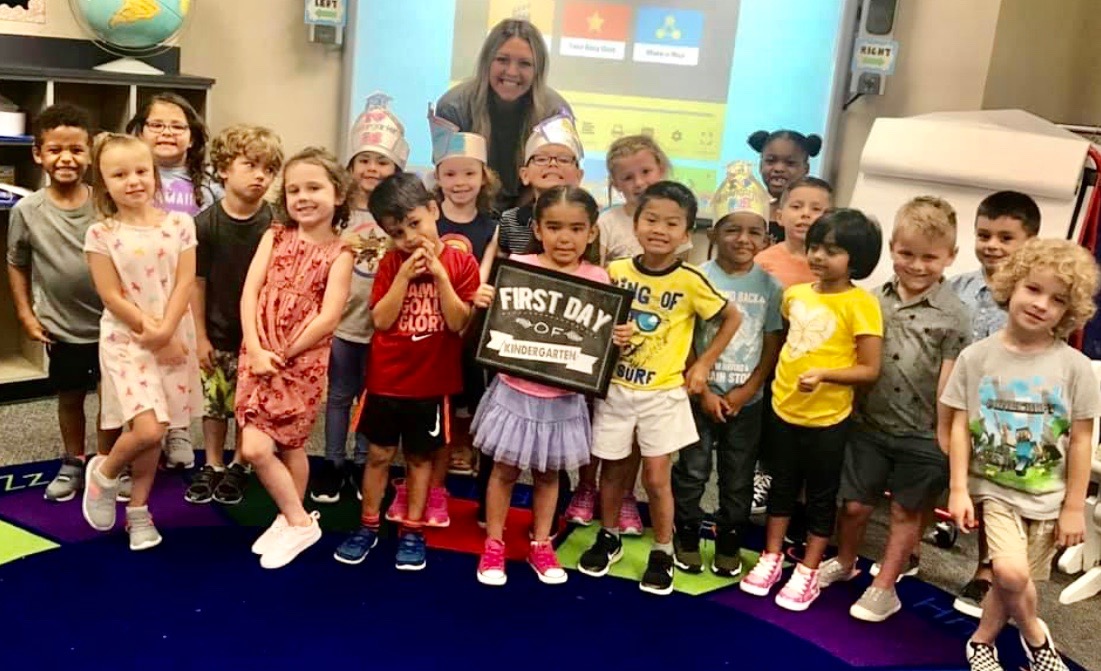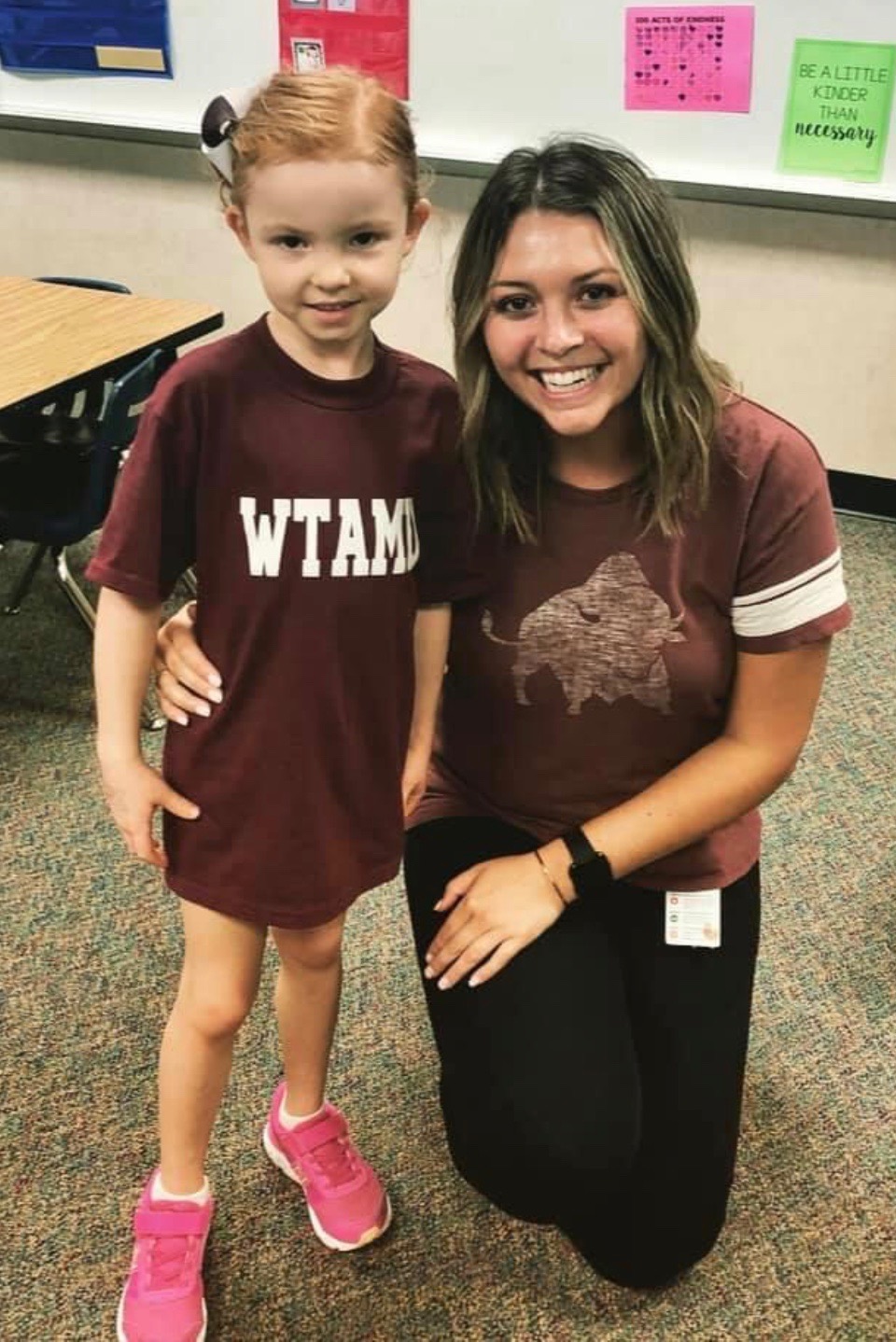- Jon Mark Beilue
- Education
Recapturing the Human Touch
In Teachers Appreciation Week, teachers long for classroom
Hereford Independent School District allowed teachers to return to their classrooms for a few hours on the first Monday of May, the first day of what happens to be National Teachers Appreciation Week.
Suffice to say, there’s never been a Teachers Appreciation Week quite like this one.
Anyuli Lopez, a fifth-grade science and social studies teacher at West Central Elementary School, breathed in the quiet of what once was. It was just the second time in nearly two months she had stepped into her classroom.
There was a to-do list on her desk. On the desks in front of her she could see the favorite pens of students in the place they kept them, planners where they left them — all ready to resume after spring break.
“It was very surreal – kind of eerie almost,” Lopez said. “I can get emotional when I look at a student’s desk and think about them and hope they’re doing OK.”
Alisa Madina has 22 kindergartners at McGowen Elementary in her hometown of McKinney, the growing city north of Dallas. It’s tough for 5-year-olds to even understand the concept of a spring break, but Madina tried her best to get the point across.
“I explained now this is how many days you’ll be gone, and when we get to this Monday, I’ll see you again,” Madina said. “You send them off, blow kisses to each other, you walk out the door, and you didn’t know that really was your goodbye to them. We didn’t get any kind of closure. I kind of feel like I betrayed them.”
Lopez and Madina graduated within one year of each other from West Texas A&M University – Lopez in 2015, and Madina in 2016. They are two of hundreds of educators locally and statewide with WT degrees. One study showed 70 percent of teachers and administrators in the Texas Panhandle had at least one degree from WT.
But at no time in their four-year curriculum at WT was there time spent learning how to teach in a global pandemic, how to fill in unexpected gaps, how to abruptly say goodbye to students. The COVID-19 pandemic ground traditional teaching to a halt, making the profession even more challenging while at the same time more appreciated.
There are Leap Forward and See Saw and any number of online learning programs to facilitate distance learning or at least retention, but the reality is those programs try to make the best of a difficult if not near-impossible situation, one in which so much is out of a teacher’s hands.
*Photo: Alisa Madina, who graduated from WT in 2016, said she feels like she almost "betrayed" her "kinder-babies" when they left for spring break, thinking they would return in a week Madina teaches in the McKinney ISD.
“Communication is a challenge,” Lopez said. “Even though we’re communicating through a computer, they’re not seeing me working through a problem and not asking me questions directly. I can’t help them as quickly as I can in the classroom.
“They do have computer skills, but they’re still children. They still have these questions they want answered, and it’s much harder to communicate with them.”
Those are for students around age 11. Trying virtual learning with 5-year-olds. Herding cats, anyone?
“Kindergartners are not as independent as others grades,” said Madina, her first year at that level in her fourth year of teaching. “Normally, our parents are not required to do a lot at home with them. But now this requires parents to do a lot.
“I have parents who are working because they’re essential and they can’t help. I have parents who don’t understand technology, and it requires a lot of phone calls and step-by-step walkthrough. And some have never contacted me and their children aren’t doing any assignments and I can’t reach mom and dad. So it’s very discouraging for those students.
“So that makes me sad and stresses me out. I struggle thinking of the ones not doing the things they should be doing.”
‘I don’t know if you can put a value on teachers’
This most unusual National Teachers Appreciation Week has fostered perhaps the most profound appreciation yet from parents who’ve had to take on an extended role for teaching at home. It’s prompted funny memes, Facebook comments and an understanding of what a teacher faces daily.
“This has been an eye-opening experience for many parents, to say the least,” said Sarah Caviness. “The way they teach now is so different from when I was growing up. It’s not better or worse, just different. For me to try and teach my kids now, no, I can’t even do that.
“Teachers do this every day, sometimes with 20-plus in their classroom and they do it lovingly and love what they do. It’s just inspiring really to see all they know, and they do. I’ve always appreciated teachers, and now, we appreciate them even more.”
Sarah and Trevor Caviness have three children – Sam, an eighth grader, and Charlotte, a sixth grader, both at Austin Middle School, and Emily, a fourth grader at Coronado Elementary. Sarah is the president of the Coronado PTA.
“I don’t know if you can put a value on teachers because they are a little bit of everything especially to some kids because of their background,” Caviness said. “They’re nurturing, almost like a second home and a second parent to many of them.”
No school district is alike, but nearly all have the same principles and objectives for the grade-appropriate level. Madina’s kindergarten class will have Community Circle where she asks questions about how they’re feeling, if they are worried, or what they are doing at home. They will work on Go Math!, or the art teacher will appear on a screen and together they’ll draw a llama.
“These babies need to learn by doing and they need to learn with their hands getting dirty and messy,” Madina said. “They need to be actively involved and it’s difficult to do that in front of a computer screen and iPad. Though we love our tablets, that’s not what we prefer to be doing.”
*Photo: Anyuli Lopez, a fifth-grade teacher in Hereford, said she will be more appreciative when she gets to see her students daily. "We're told as educators how important relationships are with students, and how important human interaction is," said Lopez, a 2015 WT graduate.
For Lopez, returning from spring break and into April would be preparation for the STAAR test. With that eliminated, the focus, like in many online classrooms, was on review and retention with the Leap Forward program. Learning a new unit in this way seemed too daunting. For Lopez, her science students focused on retaining the Properties of Matter unit.
“There’s always a little bit of regression even from the strongest students over the summer and now you add two extra months to that, and it’s something I’m really nervous about,” Lopez said. “We’re doing our best and you can tell the kids are really trying. But we don’t know how much content they’re actually retaining.”
Teachers are aware there will be added gaps when learning begins in the classroom that all hope will resume in August. Patience will be key.
A teacher appreciation week may have more than a one-way meaning in 2020. For teachers, when learning returns to a gathering place, it will be welcome in many ways.
“I’ll be a lot more appreciative of getting to see them every day,” Lopez said. “We’re told as educators how important relationships are with students and how important human interaction is.
“For me, it might be a little overwhelming because I’ve learned how much I miss that and need that interaction. So much of teaching is giving of yourself. Being able to do that again, I’m going to realize how special that is.”
Do you know of a student, faculty member, project, an alumnus or any other story idea for “WT: The Heart and Soul of the Texas Panhandle?” If so, email Jon Mark Beilue at jbeilue@wtamu.edu.
—WTAMU—



